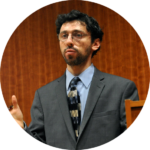Liebmann Meyer Wulff (1745-1812), a Jewish banker who was known as the “Croesus of Berlin,” was arguably the founder of this synagogue, for it was in his home at 33 Koenigstrasse that the early Lippmann Taus congregation (then only a minyan) first gathered for services. The modest prayer room eventually developed into a synagogue and Beit Midrash (house of learning), after which it was moved to 21 Friedrichstrasse, where, from 1868 onwards, Baer Moses presided over services. In 1880, the synagogue was moved to a new address on the corner of Alexanderstrasse—there, from 1885 onwards, Jacob Moses led the congregation. Oskar Sacharja Lipschuetz took on this role in the 1860s, but lost his job after refusing to douse a fire that broke out in the synagogue during a Yom Kippur Kol Nidre service. Although Lipschuetz took on a job at the Wolf Etz Chaim synagogue, he later returned to the Lippmann Tauss congregation and helped it find a new home in a factory building at 12 Gollnowstrasse; Lipschuetz served Lippmann Tauss congregation until his death in 1919, after which the rabbi was Felix Singermann. In 1926, this Orthodox synagogue had 260 members. Known for its school for religious studies, the synagogue was subsidized by the official Jewish Community of Berlin, whose purpose was to oversee Jewish community and religious life in the whole city. On Pogrom Night (November 1938), the Lippman Taus synagogue on Gollnowstrasse was severely damaged; the building was destroyed completely during the war years. In 1942, Rabbi Singermann was deported together with his family. Benjamin Rosenzweig, the congregation’s school teacher in the late 1930s, was deported to Riga together with his wife and six children. At the time of writing, efforts were underway to reconstruct the synagogue.
Esther Sarah Evans
Copyright: Pogrom Night 1938 - A Memorial to the Destroyed Synagogues of Germany/ Germansynagogues.com
Notes
Sources: Die Berliner Privatsynagogen und ihre Rabbiner 1671-1971, Max Sinasohn [author and publisher], 1971, Synagogen in Berlin: Zur Geschichte einer zerstörten Architektur, Rolf Bothe [Ed.], [publisher] Willmürth Arenhövel, 1983.2








